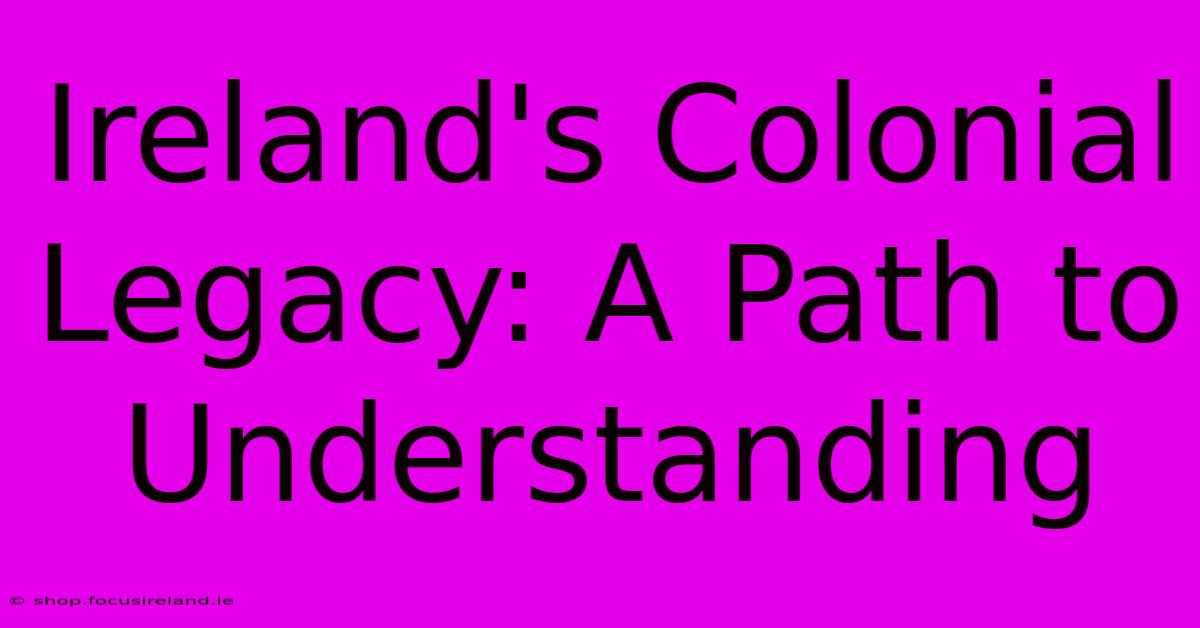Ireland's Colonial Legacy: A Path To Understanding

Table of Contents
Ireland's Colonial Legacy: A Path to Understanding
Ireland's history is deeply intertwined with colonialism, a complex and often painful legacy that continues to shape its identity and political landscape today. Understanding this legacy requires examining its multifaceted nature, from the centuries of British rule to its ongoing impact on Irish society and its relationship with the rest of the world.
The Centuries of British Rule: A Legacy of Oppression
The history of British rule in Ireland spans centuries, marked by periods of intense conflict and oppression. Beginning with the Norman invasion in the 12th century, English influence gradually expanded, leading to the systematic dispossession of Irish land and the suppression of Irish culture.
The Plantation of Ulster: A Defining Moment
The Plantation of Ulster in the early 17th century stands as a particularly brutal example of colonial policy. English and Scottish settlers were granted vast tracts of land, displacing the native Irish population and fostering deep-seated religious and ethnic divisions that persist to this day. This period sowed the seeds of future conflict and significantly impacted the demographic makeup of the island.
The Penal Laws: Systematic Suppression
The Penal Laws, enacted throughout the 18th century, aimed to systematically suppress the Catholic majority. These discriminatory laws restricted land ownership, education, and political participation, severely limiting the opportunities available to Irish Catholics. The legacy of these laws continues to be felt in the socio-economic disparities within Ireland.
The Great Famine (1845-1849): A Catastrophic Turning Point
The Great Famine, caused by potato blight, resulted in the deaths of over one million people and the emigration of millions more. While not solely a consequence of British policy, the famine exposed the inadequacy of the British government's response and further deepened the resentment towards British rule. The famine's impact on the Irish population and its diaspora is profound and continues to be a significant part of the national narrative.
The Struggle for Independence and its Aftermath
The late 19th and early 20th centuries saw a resurgence of Irish nationalism and the eventual achievement of independence in 1922. However, the partition of Ireland created a new set of challenges, leaving a legacy of conflict in Northern Ireland that continues to this day.
The War of Independence (1919-1921): A Fight for Self-Determination
The War of Independence, a brutal struggle against British rule, ultimately led to the establishment of the Irish Free State. This period cemented the idea of Irish self-determination and shaped the national identity for generations to come. However, the partition of the island left a lingering wound that continues to impact the political landscape.
The Troubles (1968-1998): A Legacy of Conflict in Northern Ireland
The conflict in Northern Ireland, known as "The Troubles," was a bloody and protracted struggle marked by violence and political division. This period highlighted the deep divisions rooted in the colonial legacy, particularly religious and sectarian differences. The Good Friday Agreement in 1998 brought an end to the large-scale violence, but the legacy of the Troubles continues to shape Northern Irish society.
The Ongoing Impact of Ireland's Colonial Past
The colonial legacy continues to exert a significant influence on contemporary Ireland. Its effects are visible in many aspects of Irish life:
- Socio-economic disparities: The lingering effects of historical injustices are evident in regional differences in wealth and opportunity.
- Political landscape: The partition of Ireland and the ongoing tensions in Northern Ireland are direct consequences of the colonial past.
- Cultural identity: Irish culture has been profoundly shaped by its colonial experience, exhibiting both resistance and adaptation to external influences.
- International relations: Ireland's relationship with Britain and other former colonial powers remains complex and often fraught with historical baggage.
Understanding Ireland's colonial legacy is crucial for comprehending its present and future. It is a complex and multifaceted story, requiring a nuanced and critical approach that acknowledges both the suffering inflicted and the resilience displayed by the Irish people throughout history. By acknowledging this past, Ireland can continue its journey toward reconciliation and a more just and equitable future.

Thank you for visiting our website wich cover about Ireland's Colonial Legacy: A Path To Understanding. We hope the information provided has been useful to you. Feel free to contact us if you have any questions or need further assistance. See you next time and dont miss to bookmark.
Featured Posts
-
The Ultimate Ireland Weather Guide June 2024 Edition
Apr 03, 2025
-
Best Of Carrickfergus B And B Recommendations
Apr 03, 2025
-
Unforgettable Newcastle B And B Stay
Apr 03, 2025
-
Become A Teacher In Ireland A Comprehensive Guide
Apr 03, 2025
-
Your Ferry To Spanish Delights
Apr 03, 2025
